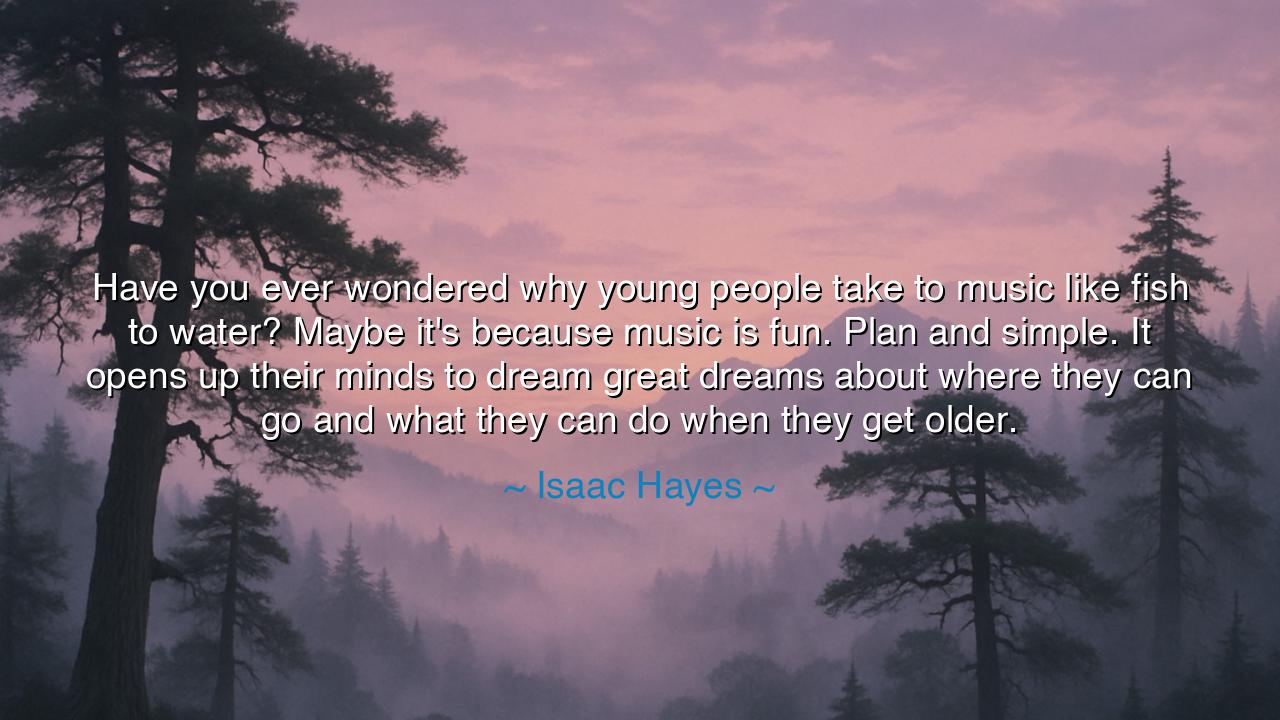
Have you ever wondered why young people take to music like fish
Have you ever wondered why young people take to music like fish to water? Maybe it's because music is fun. Plan and simple. It opens up their minds to dream great dreams about where they can go and what they can do when they get older.






The words of Isaac Hayes, “Have you ever wondered why young people take to music like fish to water? Maybe it’s because music is fun. Plain and simple. It opens up their minds to dream great dreams about where they can go and what they can do when they get older,” carry the warmth of truth spoken by one who knew the spirit of rhythm as the pulse of life itself. Beneath their simplicity lies a profound understanding of human nature—that music is not merely sound, but freedom, and that the heart of youth, unburdened by cynicism, recognizes this instinctively. Hayes, a musician, philosopher, and teacher in his own right, saw that music is the language of possibility, the first art that teaches the soul how to dream.
To understand the origin of this quote, we must look to Isaac Hayes himself—one of the great architects of soul music, whose deep voice and deeper wisdom helped to define a generation. He rose from poverty in Tennessee, a child raised by his grandparents after his parents passed away, and found in music not escape, but awakening. Through melody and rhythm, he discovered a way to reach beyond circumstance and touch the infinite. When Hayes spoke of young people taking to music “like fish to water,” he was not speaking in metaphor alone; he was describing the natural unity between the human spirit and sound. For music, like water, nourishes, sustains, and reflects life. It gives form to emotion, and it allows the young mind to explore worlds beyond what the eye can see.
There is an ancient truth in this. Long before words were written, humanity spoke through song. The tribes of Africa—Hayes’s ancestral roots—used drums to speak across distance, to summon the community together, to tell stories of creation and courage. In the temples of Greece, philosophers declared that music shaped the soul more profoundly than law or war. Even the prophets of Israel sang their prayers as psalms. Across time, music has always been the bridge between the known and the mysterious, between the heart and the divine. The young, still close to innocence, feel this connection most purely. They do not question music—they live in it. And that is why, as Hayes said, it opens their minds to dream great dreams—for through rhythm, they sense that life itself has rhythm, and that their own dreams can one day find harmony with it.
Consider the story of a young man named Ludwig van Beethoven, who as a boy lived in darkness and fear under an abusive father. His childhood was marked by hardship and silence, yet within him, music burned like a sacred fire. Even when his hearing began to fail, he clung to his art. Deafness could not imprison his spirit. Out of suffering, he created symphonies that still move hearts centuries later. In Beethoven, we see the living truth of Hayes’s words: that music gives the young the courage to dream, even when the world offers despair. It gives them vision, and from vision comes creation.
Music is fun, Hayes said—plain and simple. Yet that simplicity hides a deep wisdom. For joy itself is a sacred teacher. When a child picks up an instrument or hums a tune, they are not only playing—they are learning the rhythm of imagination, the balance between chaos and order, the courage to express what words cannot say. Music is the training ground of the soul, where discipline and delight become one. It teaches patience through practice, confidence through creation, and empathy through listening. In this way, music prepares the young not only to perform, but to live—to dream boldly, and to walk with purpose into the future.
And there is something more: Hayes reminds us that music belongs to everyone. It does not discriminate by wealth, color, or creed. A poor child with a drum, a rich child with a piano, both enter the same kingdom of sound. It is a democracy of the heart, where all may speak and all may listen. Through music, the young learn unity; they discover that harmony is not uniformity, but the blending of difference into beauty. In this lesson lies the seed of peace.
So, the teaching of Isaac Hayes is both tender and powerful: feed the dreams of the young with music. Let them sing, let them play, let them find themselves in sound. For through that joy, they will come to know who they are and who they might become. Do not suffocate their imagination with silence or fear; give them rhythm, and they will give the world greatness. Encourage them to listen—not just to melodies, but to the deeper song of life that flows beneath all things.
For when the young take to music like fish to water, it is because they are returning home—to the sea of creation itself. Music reminds them, as it should remind us all, that we are not meant merely to exist, but to resonate—to vibrate with passion, compassion, and purpose. And when we dream to that rhythm, as Hayes taught, we not only become artists of sound—we become artists of life.






AAdministratorAdministrator
Welcome, honored guests. Please leave a comment, we will respond soon